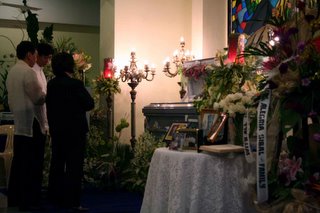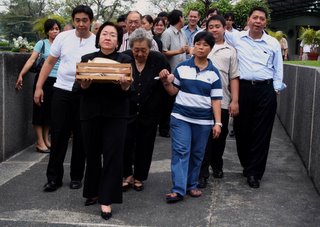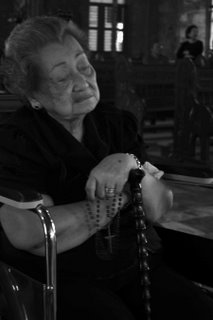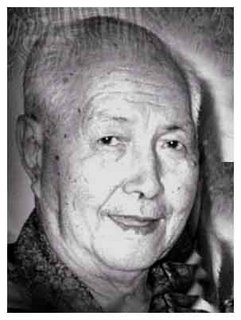It is hard to have patience with people who say, "There is no death," or "Death doesn't matter." There is death. And whatever is, matters. And whatever happens has consequences, and it and they are irrevocable and irreversible. You might as well say that birth doesn't matter.
I look up at the night sky. Is anything more certain than that in all those vast times and spaces, if I were allowed to search them, I should nowhere find her face, her voice, her touch? She died. She is dead. Is the word so difficult to learn?
from A Grief Observed by C.S. Lewis

The reality of my grandfather's death has not yet quite sunk in for me, so that I still have to consciously remind myself that he is already actually gone. Of course, the past five days were very real for me, as perhaps they were for many of us in the family— the morning of his passing last Wednesday, the preparation for his wake that evening, the comings and goings of relatives and friends at the crypt of Mt. Carmel, the funeral mass, the cremation. It was as real as any experience that shakes one to the very core. But perhaps by sheer force of memory, the fact that he is gone is not yet a comfortable fact in my mind; I have to consciously tell myself:
Lolo Ped is already dead.
You see, this is the first time that I have experienced death up close, to someone I know and love. Death, until this week, has always been something that happened to somebody else— to a friend, to a distant relative, to a classmate's parent or grandparent. It was therefore easy to keep a comfortable distance and an objective acceptance of its existence. Until last Wednesday, death was only an imagined grief, never a personal mourning. It was never a lived reality, only a dramatic interlude. It was merely philosophical, conceptual, Shakespearean even.
Until it happened to me.
This was probably why I found it so surprising and distressing that such an emotionally charged moment could be carried on amidst the ordinary hustle and bustle of everyday living. Life, it seemed, went on around us while my Lolo was dying— Doctors came in and out of the hospital room with their usual professional efficiency; Nurses and first year residents looked on with morbid curiosity while medical procedures were being carried out to keep him alive; Outside, hospital visitors and orderlies casually walked along, even as my father was breaking down in the corridor, embarrassed, even, that they were there to see him cry; In the next room, an old lady lay dead, and family members were— like us— filing into the room for a final good-bye; The public address system hummed; The vendo machines dispensed coffee; The elevator carried its passengers.
All this life and all this death, it seemed, while in room 240, someone’s eighty-six years of life were coming to an end. And everyone, it seemed, went about their daily business. It almost made me want to ask people to stay still, stand silent, pay their respects. But the world did not stop, just as it did not for that old lady lying dead in the next room.
Perhaps what W.H. Auden— that astute observer of mourning and death— wrote about suffering is true:
[. . .] how it takes place
While someone else is eating or opening a window or just walking dully along; [. . .]
* * *

But while the world did not stop as my Lolo lay dying, it did for us, in that room in Cardinal Santos. Already, I had watched helplessly as the technicians straddled the bed upon which he lay, furiously pumping his chest in the hope of jump starting his ailing heart. Six doctors looked on as the Chief of Cardiology tried for two frustrating hours to revive him, but his heart was just not strong enough. After three prior heart attacks, there wasn’t much that could still be done.
I had to go out of the room because I could not bear watching what they were doing to him. Seeing my dad break down, and now, my Lolo at the brink of death, I was fighting hard to turn back tears. Between informing relatives, comforting my dad, and telling myself that this was actually happening, the experience presented itself with amazing surreality, like I was watching a medical show on TV. Only, the tears told me that this was real.
Later, at about a quarter to ten in the morning, the doctor finally emerged from the hospital room, accompanied by my uncle who was an orthopedic surgeon. He met my dad, mom and me in the corridor fronting the hospital room and explained to us that they had been attempting to stabilize my Lolo’s heartbeat for the better part of two hours. He said that while he was still alive, it is unlikely that his heart will be able to beat on its own volition without the aid of the adrenalin injected into his body. Considering his age, the consequences of such prolonged cardiac arrest also had an adverse effect on the amount of oxygen that reached his brain. He could not tell for certain the amount of brain damage this had caused.
Finally, he said (quite calmly and deliberately, at that), “There is not much that we can do for him now. He is going any time now, and I suggest that the family begin saying their good-byes.” My uncle concurred. My dad sorrowfully gave his consent, but requested that my Lolo be kept alive until all the family arrives.
We re-entered the room moments later, and saw him on the hospital bed, unmoving, with a tube which pumped oxygen into his body fastened to his mouth. The defibrillator sat obtrusively beside his bed, the monitor scribbling erratic lines which represented the spasms of his heart.

Immediately, almost by instinct, my dad bent down to hug him, breaking down again. I could not stop my tears. My mom was at the head of the bed gently stroking his hair, also in tears. My uncle, the doctor, stood at its foot, ever with the cold detachment of a medical scientist thoroughly initiated to the mechanisms of death. My dad went out to compose himself again, and I stepped forward, leaned down and looked at my Lolo’s strangely peaceful face, and whispered into his left ear, “
Paalam, Lolo Ped. Maraming salamat.”
Sometime then, my other uncle, the youngest, had arrived with his wife, and they stood by the door in respectful distance. Moments later, my aunt arrived— the eldest child— together with my cousin, and she too broke down by my Lolo’s bedside. My dad left to pick up my Lola, who, I had just heard, was in the middle of a hysterical fit, having thrown herself sprawled on the garage floor.
While waiting for word from my dad, I watched as the nurses quietly wheeled the medical equipment out of the room. The defibrillator beside the bed scrawled irregularly jagged lines, nearly flat now— the only indication that my Lolo was still with us. The attending physician was merely waiting to declare him dead.
During those moments, I sat at the far end of the room, not quite sure of what to feel. The helplessness of the situation overwhelmed me; in the face of death we are powerless, they say. And while I knew that I would have to face it at some point in my life, as indeed, I will have to face it finally when my own time comes, death was a reality that left me emotionally unprepared. I could not rage against it; I could not stop it from coming. I could not conjure up some lofty philosophical truth to justify its happening, except that it actually was, and that I was simply being carried by the experience, watching, as death (or life) took its course.

The phone call came at around ten past ten in the morning. It was my dad, telling my uncle, the doctor, that my Lola did not want to go to the hospital anymore. After a brief exchange, he put down the phone, and with medical efficiency, turned to the nurses and said, “
Okay na, tama na yan. Tanggalin niyo na.” And I watched as they stopped pumping oxygen into my Lolo’s body. He was no longer moving, of course, and were it not for the shallow peaks and troughs of the heart monitor, one couldn’t tell whether he was merely sleeping, or already dead.
I went out for a moment; the atmosphere in the room had become just too ominously heavy. I called my brother to tell him what had happened (He had classes that morning). When I went back into the room, my Lolo had died: the heart monitor showed a flat line.
He was gone, just like that.
Perhaps it was because I thought of life as being one long motion picture in my mind, I always imagined death to be accompanied by some dramatic overture, some thunder or lightning, some dying words by which immortal poetry would be spun. But that morning, there were no violins, no thunder or lightning, no words and no expression. There were no ecstatic visions, no tunnels or mystical lights, no metaphysical manifestations of the movement of the human soul. My Lolo simply went, and we knew it only by some blimp on a black and white screen. I did not even notice that he was dead.
And just like that, eighty-six of life and love ended quite finally, without even a flutter or a flourish. Just as the world did not stop for my Lolo’s dying, I was surprised by the oppressive commonality and ordinariness of his going. It seemed so silent and fragile, that all of life itself seemed arbitrary and trivial, useless, even, in the face of the muteness and utter anonymity of death. Even Julius Caesar had to die, and Shakespeare too lamented,
Are all thy conquests, glories, triumphs, spoils,
Shrunk to this little measure?
It was then, looking down at my Lolo’s lifeless body— so much appearing as though he were merely asleep— I was able to glimpse that feeling of emptiness and despair poets write about following the conclusion of a life shared in love (certainly, no doubt, what my Lola felt, following sixty-six years of marriage):
Stop all the clocks, cut off the telephone,
Prevent the dog from barking with a juicy bone,
Silence the pianos and with muffled drum
Bring out the coffin, let the mourners come.
Let aeroplanes circle moaning overhead
Scribbling on the sky the message He Is Dead,
Put crepe bows round the white necks of the public doves,
Let the traffic policemen wear black cotton gloves.
He was my North, my South, my East and West,
My working week and my Sunday rest,
My noon, my midnight, my talk, my song;
I thought that love would last for ever; I was wrong.
The stars are not wanted now: put out every one;
Pack up the moon and dismantle the sun;
Pour away the ocean and sweep up the wood,
For nothing now can ever come to any good.
It all boiled down that, I thought: on a hospital bed, gone, forever. When Martin Heidegger wrote that we are beings onto death, I wondered: did he really know what he was talking about?
* * *

Fr. Mon Bautista, my dad’s cousin and one of my favorite Jesuit priests, said that, in the face of death, we are humbled into a recognition that we do not control so many, many things. Death, he says— especially the death of a loved-one— often forces us to pause and take a step back from the hustle and bustle of everyday living, to ask ourselves what things truly matter. He observed that the difficult thing, after all, is not “going-on” with life, but stopping— to think and ask some of the simplest yet hardest questions like
Why? or
What’s the point?My Lolo answered with the witness of his life, so filled with love for his children and for one woman, my Lola. He is perhaps one of the kindest persons I have known. His quiet manner and unobtrusive presence have demonstrated to us the surrender by which he has dedicated his life to what truly matters, so much so, that— as my dad rightfully observed— he had even surrendered his very identity.
Reflecting about the past couple of days, the reality of his death is still so much of an abstraction for many of us. I still have to consciously tell myself that Lolo Ped is actually, really gone. While I must admit that I certainly am not as devastated by his passing as perhaps my Lola, my dad or his other siblings, the constancy of his presence is a habit which will be difficult to undo, and his absence, a reality which will take much getting used to. We had taken his presence for granted, almost, so that now that he is gone, we will all have to re-learn living with the reality of his going.
As Fr. Mon said during his homily at Lolo’s Requiem Mass last Sunday, all of life and all our loves are merely gifts from God.
Lahat ng biyaya natin ay hiram lamang. I like that word:
hiram, because it captures both the overflowing goodness of the Giver, yet also reminds us of the temporariness of the gift that has been given. So be it with Lolo, whom we return somewhat reluctantly to God, knowing, with gratitude, that he has enriched our lives so much in the eighty-six years that he had lived.
He will certainly be missed.














